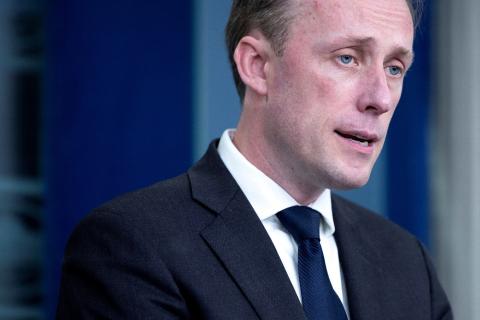
As Joe Biden rebuilds the global reputation of the US in the post-Trump era, he is recognizing a fundamental truth about soft power — that its rejuvenation often begins at home.
As Biden pledged in his inauguration address in January, the US must “lead not by the example of our power, but by the power of our example.” For the president, this means promoting national renewal with a post-pandemic governing agenda that brings the country together, rather than driving it further apart.
The schisms right now are not just political, between Democrats and Republicans, after Donald Trump’s controversial presidency and his refusal to concede the 2020 election; the US has been in wider social and economic ferment in recent years.
Key developments include the killing of George Floyd last year and the Black Lives Matter movement, the increased prominence of white supremacist movements, and dialogues on equality and sexual violence following the MeToo revelations. This is why, after the rancor of recent times, Biden is seeking to heal frayed relations and move the country closer toward realizing one of its longstanding mottos — “e pluribus unum” (out of many, one).
If the Biden team gets this agenda right, including creating a fairer, more inclusive economy, it will do much to address the rupture of trust and credibility in the US. However, it may not be enough in itself to allow the nation to fully recover from the soft power nadir of the last administration.
Biden is not just re-embracing alliances and multilateralism. Through Samantha Power as the new head of the US Agency for International Development (USAID), with its annual budget of $41 billion, he wants US policy to again become a voice of conscience and moral clarity.
At a time when Washington is facing a series of complex foreign policy challenges, the Biden administration recognises that it will benefit from more engaged, strong, and supportive allies.
Andrew Hammond
Beyond the long-standing programs in food security, education, global health and women’s empowerment, USAID will focus on four key issues during Biden’s presidency — the pandemic, climate change, conflict and state collapse, and democratic backsliding.
While the challenges ahead are huge, Power and Biden are convinced (unlike the Trump team) by the importance of soft power — the ability to achieve goals by attracting and co-opting others, rather than by coercing. This concept is sometimes misunderstood and criticised, but history underlines the key role it has played before. For example, Washington used soft power resources skilfully after the Second World War to encourage other countries into a system of alliances, such as NATO, the IMF, the World Bank, and the UN. The Cold War was subsequently won by a strategy of containment and cultural vigor.
At a time when Washington is facing a series of complex foreign policy challenges, the Biden administration recognises that it will benefit from more engaged, strong, and supportive allies. This is true from helping to find a resolution to the nuclear stand-off in Korea and combating the continuing threat from international terrorism, to tackling the range of threats posed by sizeable, revisionist powers such as Russia.
The Biden team is keen to learn from some of the successes and failures of the Obama presidency. Coming into office in 2009, Barack Obama confronted a situation in which anti-US sentiment was at its highest levels since at least the Vietnam War because of the international unpopularity of the George W. Bush administration’s policies, not least the war in Iraq.
During those Obama years, there was a substantial increase in foreigners again regarding the US as the most admired country in the world. This turnaround in fortunes was not only been welcomed in Washington, but also in corporate America following concerns during the Bush years that US-headquartered multinationals were becoming a focus for commercial backlash from anti-Americanism.
While Obama made progress with his global public diplomacy efforts, the scale of the challenge he faced meant that he left much undone. Perhaps the biggest failure of his global public diplomacy was toward what he has called the Islamic world, and there remained pockets of very high anti-Americanism in several key states, including Pakistan and Egypt, at the end of his presidency.
So the Biden team is seeking a sustained, significant push on these issues, at home and abroad, to try to turn around the spike in anti-US sentiment during Trump"s presidency. There is significant opportunity for the nation in the years to come, and the White House will now hope that this will create an enabling (rather than disabling) environment across the world for covert and overt policy cooperation and information sharing with US officials.
Andrew Hammond is an Associate at LSE IDEAS at the London School of Economics
Disclaimer: Views expressed by writers in this section are their own and do not necessarily reflect Arab News" point-of-view












